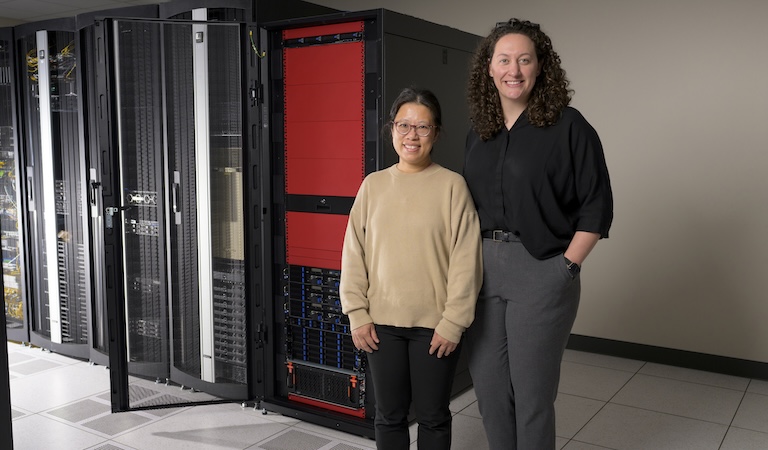NSF Grant Expands High-Performance Computing Research
November 25, 2024
Harvey Mudd College and Claremont McKenna College have been awarded a $918,485 grant from the National Science Foundation (NSF) to acquire a high-performance computing (HPC) cluster, significantly expanding The Claremont Colleges’ research capabilities across multiple disciplines.
The grant, part of the NSF’s Major Research Instrumentation program, is a collaborative effort between Harvey Mudd College and Claremont McKenna College, aimed at preparing the next generation of students for careers in data science, computational research and interdisciplinary analysis. The project’s principal investigator is Paul Nerenberg from Claremont McKenna College. Harvey Mudd professors Jamie Haddock and Bilin Zhuang played key roles as co-principal investigators by contributing their expertise in mathematics and chemistry, respectively. The project team also includes HMC faculty Sarah Kavassalis, assistant professor of climate and chemistry, Dede Long, assistant professor of economics, and Heather Zinn-Brooks, assistant professor of mathematics; CMC faculty members Shibu Yooseph, Kravis Professor of Computational Biology and Bioinformatics, Chiu-Yen Kao, Keck Foundation Professor of Applied Math and Computer Science, Ben Gillen, associate professor of economics, and Angela Vossmeyer, Rothacker Family Associate Professor of Economics and George R. Roberts Fellow.
The new HPC cluster will provide a powerful mix of CPU and GPU resources, enabling researchers at HMC and CMC to run complex simulations and process massive datasets that were previously beyond reach. The enhanced computational power will support an array of projects led by faculty, including the development of algorithms for analyzing large microbiome datasets, mathematical models for understanding opinion dynamics, and simulations of chemical interactions at the molecular level. The HPC cluster will allow students to gain hands-on experience with advanced computational techniques, giving them a competitive edge in both academic and industry settings.
Additionally, the cluster will support the research of faculty in the consortium by allowing access to the HPC and its capabilities, inherently involving undergraduate students at all levels.
“One of the most exciting things about having access to HPC resources is the computational scale it allows one to imagine,” said Haddock. In Haddock’s research and teaching, she deals with computational problems that scale “combinatorially,” meaning that the cost of computing grows more quickly than the size of the problem. The high cost of computing results in researchers frequently encountering numerical experiments that max out the computing power of their personal computers.
“Being able to offer them access to HPC resources removes some of this limitation and means that the mathematics we want to explore won’t be restricted by our ability to compute,” said Haddock.
Zhuang explained that students in their research group are eager to explore a range of scientific problems using the HPC. Zoe He ’27 is investigating the thermodynamic origins of the interactions between amino acid sequences “to help us better understand the behaviors of intrinsically disordered proteins, which are ubiquitous in our body, not well studied yet and hold a lot of therapeutic potentials,” said Zhuang. The HPC would allow He to perform a thorough and systematic study over a wide range of amino acid sequences, and dramatically accelerate the research, Zhuang said.
In addition to supporting faculty and student research, the grant will expand outreach opportunities, including summer research programs for high school students from underrepresented backgrounds. By engaging a diverse group of young scholars, HMC aims to inspire future generations to pursue careers in computational science and data analysis.
The HPC cluster is expected to be operational by 2025, and HMC faculty are already planning projects that will leverage its capabilities. The project team anticipates organizing HPC training workshops, integrating cluster resources into classes and hosting an annual HPC Research Symposium to showcase discoveries made with the HPC cluster. Because HPC resources are typically accessed remotely through the individual user’s personal device, the HPC and its resources will remain at the CMC campus indefinitely for consortium members to access.
